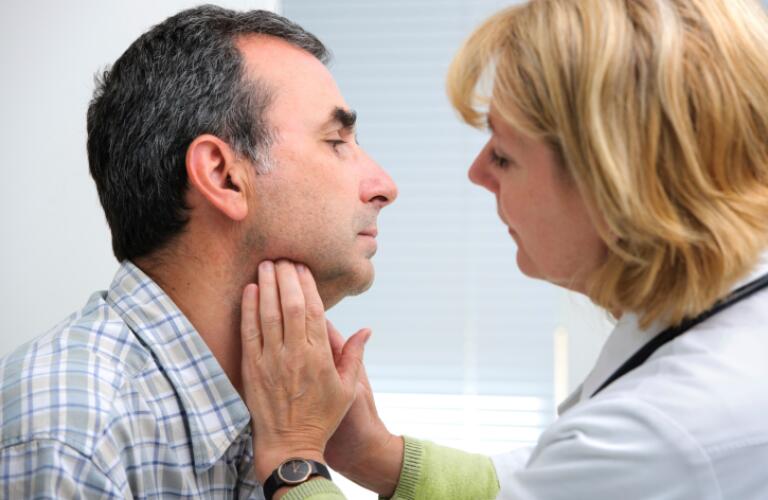
Lymph nodes are small, bean-shaped structures that are part of your immune system. We each have about 600 of them, and their job is to filter lymph—a fluid that travels around your body battling infection, toxins and even cancer cells. Lymph nodes are not glands, though many people think of them that way. When they swell, they can become painful, and there are times when you should call your doctor about your swollen lymph nodes.
Common Causes of Enlarged or Swollen Lymph Nodes
Any infection by bacteria, viruses, or even a fungus can make your lymph nodes swell. The reason they swell is because the white blood cells that fight infection build up in the nodes. As they multiply, they can make your lymph nodes enlarge and become sore. The swollen nodes are often near the site of the infection; if you have a sore throat, the nodes in your neck might swell. You’ll most often notice swollen lymph nodes in the neck, armpits and groin.
Swollen lymph nodes are also a symptom of cancer that can start in the lymph nodes. This is lymphoma. Cancer from other areas in the body can spread to a lymph node. This is metastatic cancer. However, enlarged lymph nodes from either lymphoma or other types of cancer occurs much less often than from infection. Other possible causes of swollen lymph nodes include injury and systemic conditions like AIDS.
Treatment for Swollen Lymph Nodes at Home
If your lymph nodes are bothering you and you have a cold, flu or other obvious infection, you can take an over-the-counter pain reliever or use a warm compress to relieve the pain. Apply the compress for 15 to 20 minutes at a time. Usually, the swelling in your lymph nodes will go down as you get over your infection.
When to See a Doctor for Swollen Lymph Nodes
Though most cases of enlarged lymph nodes are due to your body’s normal reaction to infection, there are situations when you should see your healthcare provider about swollen lymph nodes.
It’s time to call your doctor if:
Your lymph nodes swell for no obvious reason.
They increase in size and you have had them for more than two weeks.
The node feels hard and doesn’t move when you push on it.
You have a fever that doesn’t go away, night sweats, fatigue, or weight loss.
The swollen node is close to the collarbone or lower neck.
You have inflamed skin around the swollen node.
You have difficulty breathing.
Who to See for Swollen Lymph Nodes
Usually, swollen lymph nodes will go away on their own, but it’s important to see a doctor if you have concerns. Only a physician can diagnose the underlying cause of swollen lymph nodes. Call your primary care physician first for an initial evaluation. If swollen lymph nodes are due to a bacterial infection, you may need antibiotics to help cure the infection. Your doctor may also suggest further evaluation and testing with a specialist, such as an infectious disease doctor or hematologist.







